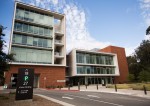UCLA researchers received $5 million to develop a new method for diagnosing lung cancer.
The National Cancer Institute awarded the grant to researchers in the UCLA School of Dentistry and the David Geffen School of Medicine, a university press release announced Monday. David Wong, a professor at the School of Dentistry, created a technology named electric field-induced release and measurement which can detect tumor mutations from blood and saliva samples in almost real time. This could help doctors treat cancer before surgery is necessary.
In prior studies, Wong was able to use the technology to diagnose lung cancer with the same accuracy as a traditional biopsy 90 percent of the time.
The funding from the NCI will be used to conduct a study to clinically evaluate the effectiveness of the diagnostic tool. In the study, researchers will test the blood and saliva of 300 at-risk patients in order to determine common biomarkers of lung cancer.
These biomarkers will be used for diagnosis when it is unclear if a patient has cancer. Researchers can determine within a day after the initial analysis whether or not a patient should undergo a lung biopsy.
This new technology could categorize patients based on the cancer’s severity, reducing unnecessary procedures in patients without a diagnosis and prioritizing patients with a severe illness. It could also provide an affordable option for patients who cannot afford to have surgery to biopsy their lungs or those who are too sick for surgery.
